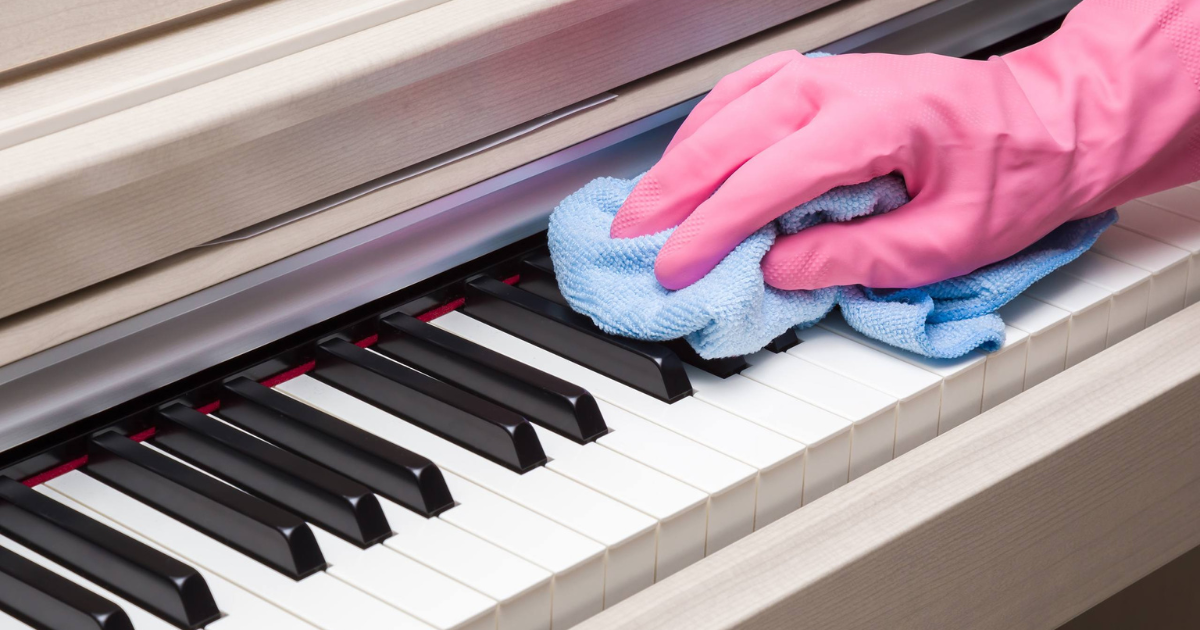
Piano keys are both delicate and essential for quality performance, so keeping them clean is important for both aesthetics and functionality. Regular cleaning can prevent grime, oils, and dust from building up, which not only helps the keys look pristine but also prolongs their lifespan. Here’s a comprehensive guide on how to clean piano keys safely and effectively.
1. Determine the Type of Keys
Before cleaning, identify if your piano keys are made of ivory or plastic:
- Ivory keys: Commonly found on older pianos, ivory keys have a slightly yellowish tint. They are more porous and can be sensitive to cleaning agents.
- Plastic keys: Most modern pianos have plastic keys, which are more durable and easier to clean.
Understanding the material is crucial, as it will influence the cleaning products and methods used.
2. Gather Your Cleaning Supplies
To clean piano keys effectively, you’ll need:
- A soft, lint-free cloth or microfiber cloth
- Distilled water
- Mild dish soap (optional for extra cleaning power)
- White vinegar (optional for ivory keys)
- Soft-bristled brush (for dust and grime in key gaps)
- Cotton swabs (optional for detailed cleaning)
Avoid harsh chemicals, alcohol-based cleaners, or abrasive cloths as these can damage the keys.
3. Cleaning Procedure for Plastic Keys
- Prepare a Cleaning Solution: Mix a few drops of mild dish soap with distilled water. Distilled water is preferable as it doesn’t contain minerals that could leave residue.
- Dampen the Cloth: Lightly dampen the cloth with the solution. Ensure the cloth is not too wet; you want it slightly moist to avoid water seeping between the keys.
- Wipe the Keys: Wipe each key individually from back to front. Avoid wiping side to side, as this could spread dirt between the keys. Work on a few keys at a time, then dry with a separate cloth immediately after cleaning to prevent moisture from settling.
- Repeat if Necessary: For stubborn stains, gently rub the key a few times with the damp cloth. Avoid scrubbing too hard.
4. Cleaning Procedure for Ivory Keys
Ivory keys require extra care:
- Prepare a Vinegar Solution: Mix one part white vinegar with four parts distilled water. The acidity in vinegar helps lift stains without damaging ivory.
- Dampen and Wipe: Lightly dampen a cloth with the vinegar solution, then carefully wipe each ivory key individually. As with plastic keys, wipe from back to front.
- Expose to Natural Light: Ivory can become yellowed over time, but sunlight exposure can help lighten it. Leave the keys uncovered in natural light for a few hours, but avoid direct sunlight as it could cause warping.
5. Detailed Cleaning: Key Gaps and Grime Removal
To clean the narrow spaces between keys:
- Use a Soft Brush or Cotton Swab: Gently clean the sides of each key with a soft-bristled brush or a slightly damp cotton swab to remove dust and debris.
- Use Compressed Air: For pianos with extensive buildup, compressed air can be used to blow dust out from tight areas, especially useful in keyboards with many keys.
6. Maintenance Tips to Keep Your Piano Keys Clean
- Wash Hands Before Playing: Encourage players to wash their hands before playing to minimize oil and dirt transfer.
- Use a Piano Cover: Cover the keys when not in use to prevent dust buildup.
- Avoid Eating or Drinking Near the Piano: This will prevent spills and crumbs from damaging the keys.
